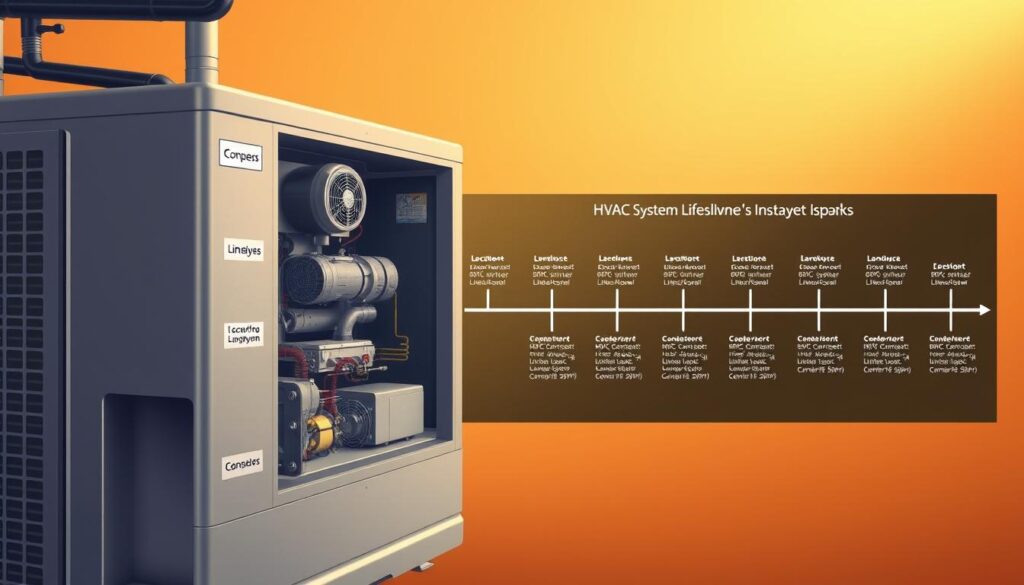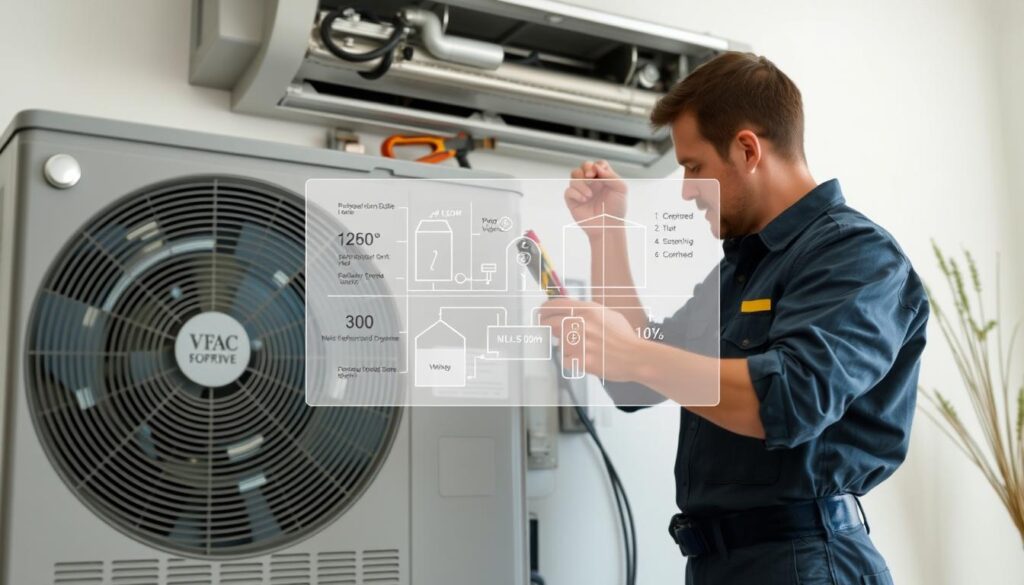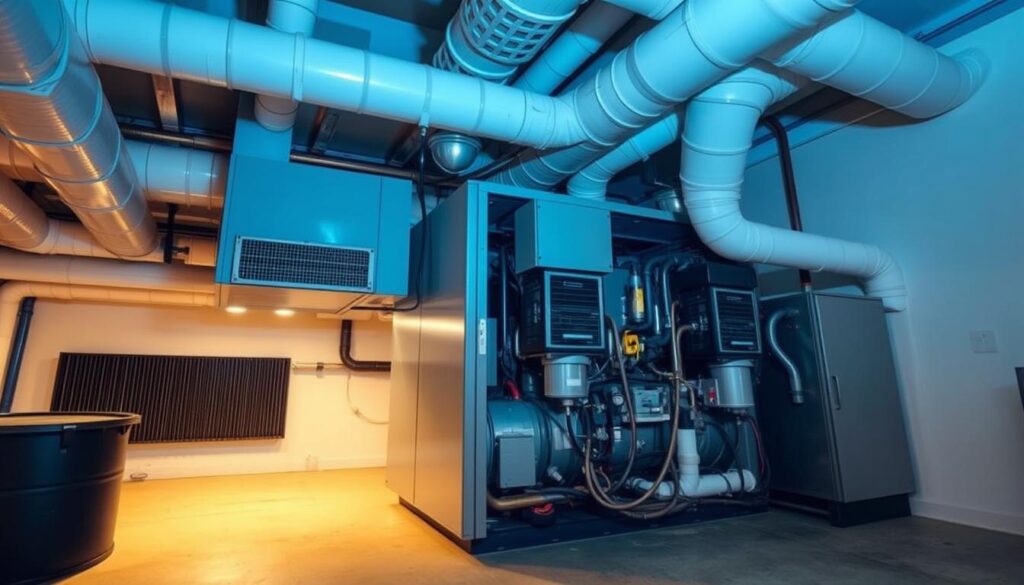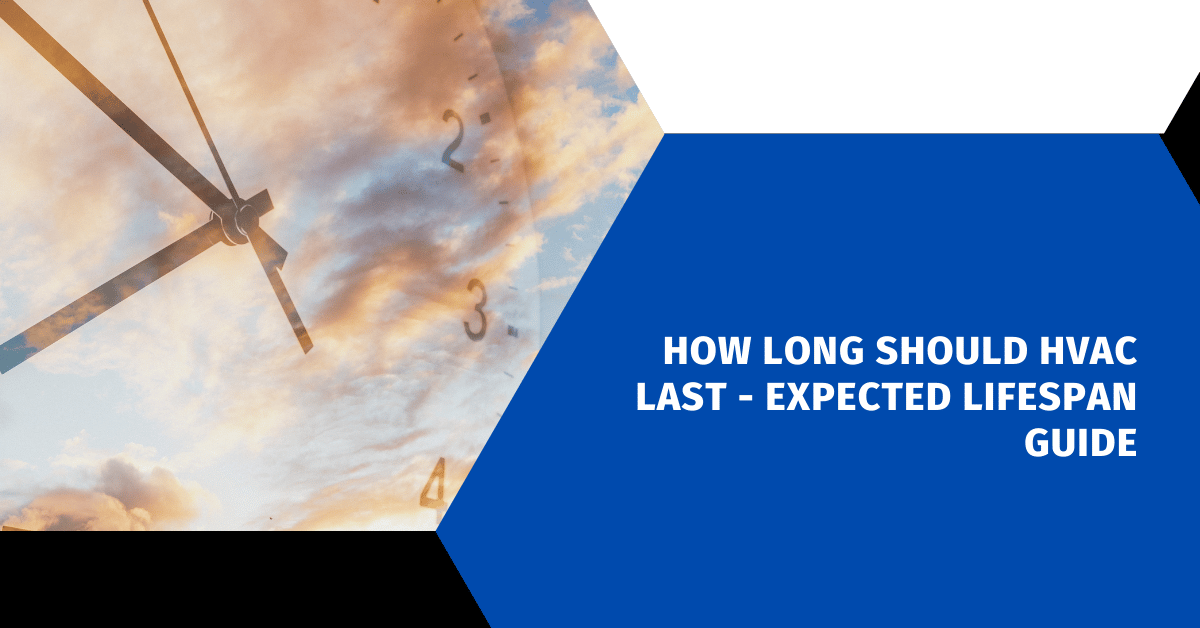Affiliate Disclosure
HVAC Guide Guys is a participant in the Amazon Services LLC Associates Program, an affiliate advertising program designed to provide a means for sites to earn advertising fees by advertising and linking to Amazon.
How Long Should HVAC Last? Ever thought about how long your home’s HVAC system will last before needing a new one? Knowing how long an HVAC system usually lasts can save you a lot of money. It also helps you plan for home maintenance better.

Your HVAC system is a big investment in your home’s comfort. Most homeowners aim to get the most out of their system. The average lifespan of an HVAC system is 15 to 25 years. But, several factors can affect how long your system will last.
This guide will cover everything you need to know about how long an HVAC system lasts. It will help you make smart choices about maintenance, repairs, and when to replace your system.
Key Takeaways
- HVAC systems typically last between 15-25 years with proper maintenance
- Regular professional servicing can significantly extend system life
- Different HVAC components have varying expected lifespans
- Climate and maintenance impact overall system durability
- Strategic upgrades can improve system efficiency and longevity
Table of Contents
Understanding HVAC System Basics and Lifespans
Your home’s HVAC system is a complex network. It keeps you comfortable. Knowing how it works helps you make smart choices about replacing or extending its life.
HVAC systems vary in type and lifespan. The right one can last for years, providing comfort, with regular care.
Types of HVAC Systems
- Central Air Conditioning: Typically lasts 15-20 years
- Gas Furnaces: Can operate efficiently for 20-30 years
- Heat Pumps: Average lifespan of 10-20 years
- Boilers: Can last 20-35 years
Factors Affecting System Durability
Several factors affect your HVAC system’s life:
- Regular maintenance
- Installation quality
- Local climate conditions
- Usage patterns
- Equipment quality
Average Lifespan Expectations
Most HVAC systems last 15-25 years. Without care, they might only last 10 years. But, with proper maintenance, they can last longer.
Proper care is the key to maximizing your HVAC system’s performance and longevity.
Investing in regular maintenance and understanding your system’s needs can help extend its life. This might also delay the need for expensive replacements.
Expected Lifespan of Different HVAC Components
Knowing how long your HVAC system will last is key for homeowners. Each part of your heating and cooling system ages differently. This affects how long your system will last.
Let’s look at the expected lifespans of important HVAC parts:
- Furnaces: Usually last 15-20 years with good care
- Air Conditioners: Last about 12-17 years on average
- Heat Pumps: Work well for 10-20 years
- Boilers: Last the longest, up to 35 years
Your HVAC system’s life depends on many things. Keeping it well-maintained is very important. Getting it checked by pros twice a year can catch problems early.
“Preventive care is the key to extending your HVAC system’s life and performance.”
Things like how well it was installed, its size, and your local weather also matter. A bad installation can shorten its life. But, with good care, it can last longer than expected.
Homeowners should watch closely the heat exchangers and compressors. These parts decide if you need a whole new system or just repairs.
Explore Our HVAC Shop
Looking for top-rated HVAC tools, parts, and accessories? Visit our shop and find the perfect solution for your needs.
Visit the ShopHow Long Should HVAC Last in Different Climate Zones
Your HVAC system’s life span changes a lot based on where you live. Climate zones bring unique challenges that affect how long your HVAC lasts. Knowing these environmental impacts helps you plan for extending your HVAC’s life and make smart maintenance choices.
Different places have different challenges for HVAC systems. The environment greatly affects how long your HVAC should last. Some climates make systems wear out faster than others.
Coastal Area Considerations
Coastal areas have special challenges for HVAC systems. Salt in the air and high moisture levels can shorten system life. In these areas, HVAC systems usually last 7-12 years, less than in more moderate climates.
- Salt corrosion speeds up metal part damage
- High humidity can cause electrical part failures
- Regular maintenance is key to survival
Desert Climate Impact
Desert environments put a lot of stress on HVAC systems. The intense heat and dust can make systems last 12-18 years. But, they need special care to keep working well.
| Climate Factor | Impact on HVAC |
|---|---|
| High Temperature | Parts wear out faster |
| Dust Exposure | Filters and mechanical parts get strained |
| Low Humidity | Stress on electrical systems |
Humid Environment Effects
Humid climates are tough on HVAC systems. High heat and moisture can cut system life to 10-12 years. Mold, more condensation, and constant cycling speed up wear.
“In humid environments, proactive maintenance isn’t just recommended—it’s essential for system survival.” – HVAC Professionals Association
To make your HVAC last longer, think about your climate zone. Regular professional maintenance is key. Protecting your system from environmental challenges helps extend its life.
Key Factors That Impact HVAC System Longevity

Your HVAC system’s life span depends on several key factors. These factors can either make it last longer or shorter. Knowing these elements is vital for keeping your HVAC system running well.
Several core factors significantly influence your system’s durability:
- Installation quality
- Regular maintenance frequency
- System sizing and configuration
- Environmental conditions
- Usage patterns
Proper installation is key to a long-lasting system. A certified technician can ensure the right placement and setup. This reduces wear and tear.
| Factor | Impact on HVAC Lifespan |
|---|---|
| Proper Installation | Can extend system life by 3-5 years |
| Annual Maintenance | Prevents premature component failure |
| Correct System Sizing | Reduces unnecessary strain |
Environmental conditions greatly affect system performance. Extreme temperatures, high humidity, and coastal salt air can damage components faster. Areas with lots of dust or debris need more frequent filter changes.
To extend your HVAC system’s life, focus on professional installation and regular maintenance. Also, understand your local environmental challenges. This way, you can get the most out of your system’s performance and lifespan.
Explore Our HVAC Shop
Looking for top-rated HVAC tools, parts, and accessories? Visit our shop and find the perfect solution for your needs.
Visit the ShopSigns Your HVAC System Needs Replacement
Knowing when your HVAC system is nearing the end can prevent sudden breakdowns and expensive fixes. Spotting the signs of HVAC failure lets you plan for a new system before it fails completely.
Your HVAC system shows its health through different signs. Paying attention to these can help you avoid sudden failures.
Physical Warning Signs
- Unusual noises like grinding, squealing, or banging
- Visible rust or corrosion on the unit
- Cracks or damage to external components
- Persistent moisture or leaks around the system
Performance Indicators
Performance issues often point to deeper problems with your HVAC system. Look out for these key signs:
- Inconsistent temperatures throughout your home
- Weak or uneven airflow from vents
- Frequent cycling on and off
- Poor air quality or increased dust
Cost-Related Signals
| Cost Indicator | Potential Impact |
|---|---|
| Rising Energy Bills | 20-50% increase in energy consumption |
| Frequent Repairs | Costs averaging $150-$500 per incident |
| System Age | Over 10-15 years old |
*”When repair costs approach 50% of a new system’s price, replacement becomes the most economical choice.”*
If you see many signs of HVAC failure, getting a pro’s opinion is wise. They can tell if replacing your HVAC is the best move for your home’s comfort and efficiency.
Essential Maintenance Tips to Extend HVAC Life

Keeping your HVAC system in top shape is key. Regular care is vital for a long-lasting and efficient system. By following a few simple steps, you can boost your system’s performance and lifespan.
Here are some important hvac maintenance tips to safeguard your investment:
- Change air filters monthly to prevent airflow restriction and improve system efficiency
- Schedule professional annual tune-ups before winter and summer seasons
- Keep outdoor units clear with at least 12 inches of unobstructed space
- Clean air vents and registers regularly to maintain proper airflow
- Check refrigerant levels and seal any possible leaks
Preventative maintenance is a smart move for homeowners. Regular care can extend your HVAC system’s lifespan by up to 5 years.
| Maintenance Task | Frequency | Potential Efficiency Improvement |
|---|---|---|
| Air Filter Replacement | Monthly | 5-15% energy efficiency increase |
| Professional Tune-Up | Annually | 30-50% reduction in breakdown risk |
| Outdoor Unit Cleaning | Seasonally | Up to 20% improved airflow |
Spending time on routine maintenance is worth it. It not only keeps your HVAC system running well but also saves energy. Using smart thermostats and getting annual energy audits can make your system even more efficient and cut down on energy use.
Explore Our HVAC Shop
Looking for top-rated HVAC tools, parts, and accessories? Visit our shop and find the perfect solution for your needs.
Visit the ShopCost Considerations: Repair vs. Replace
Choosing between repairing or replacing your HVAC system is a big financial decision. Knowing the key factors can help you make a choice that saves money now and later.
The $5,000 Rule Explained
The $5,000 rule is a simple guide for homeowners. Here’s how it works:
- Multiply your HVAC system’s age by the repair cost
- If it’s over $5,000, consider replacing
- If it’s under $5,000, fixing it might be better
Long-term Financial Impact
Think about more than just the upfront cost when looking at hvac repair costs. Energy-efficient HVAC systems can save a lot of money over time:
- Switching from a SEER 9 to a SEER 14 air conditioner can cut energy costs by over 35%
- New systems might get tax credits and rebates from utilities
- The average cost to replace is about $7,500, with yearly savings
Think about the long-term costs. An old system with many repairs might cost more than a new, efficient one.
Pro tip: Always get multiple quotes and consider the system’s age, efficiency, and repair history before making a final decision.
Conclusion
Knowing how long your HVAC system lasts is key to a cozy home. Getting it installed right is vital for its long-term performance. By choosing professional installers and keeping up with maintenance, you can make your system last longer.
Your HVAC warranty is a big help in protecting your investment. Most systems can last 15 to 25 years with the right care. But, it also depends on how well you maintain it, how often you use it, and your environment.
Regular check-ups, timely filter changes, and fixing small issues early can save you a lot. This way, you avoid expensive repairs or having to replace your system too soon.
Be proactive about your HVAC system’s health. Get annual maintenance, keep service records, and watch for any changes in performance. Being an informed homeowner helps you save on energy costs and avoid sudden replacements. Remember, it’s cheaper to prevent problems than to fix them after they happen.
Your HVAC system is a big investment in your home. With proper care, professional installation, and keeping an eye on your warranty, it will work well for years. Stay informed, be proactive, and your HVAC system will keep your home comfortable and energy-efficient.

